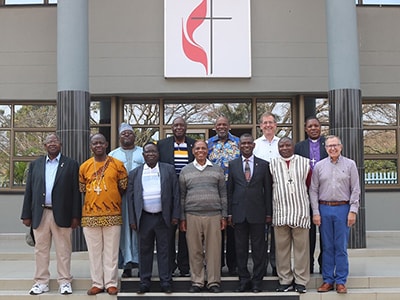Bishops in Africa have resolved not to support any proposed legislations or plans that may result in a split or dissolution of The United Methodist Church.
In a statement at the close of the Africa College of Bishops retreat Sept 2-6, the bishops said the church would continue in Africa after the 2020 General Conference.
Your support of the Episcopal Fund apportionment helps pay the salaries and benefits of United Methodist Bishops and allows them to travel across their episcopal areas providing mentorship and leadership.
“We do not support any legislation that calls for the dissolution of The United Methodist Church. We uphold our values as a connectional and worldwide church committed to ‘making disciples of Jesus Christ for the transformation of the world’,” the bishops’ statement said.
President of the Africa College of Bishops, John K. Yambasu of Sierra Leone, said the bishops would not allow others to set the agenda for the church in Africa.
The bishops said they were concerned that conversations on the future of The United Methodist Church are taking place in the United States without African representatives.

During his keynote address, Yambasu said the future of the church is not about winning and losing.
In an interview with UM News, Yambasu said this year’s College of Bishops retreat at Africa University aimed to sensitize African bishops regarding the impact of decisions on the future of the church in Africa.
Four U.S. episcopal leaders — Bishops L. Jonathan Holston of the South Carolina Conference; Scott Jones of the Texas Conference; Gary Mueller of the Arkansas Conference and James Swanson Sr. of the Mississippi Conference — attended the retreat.
Representatives of the Africa Initiative and Renewal Coalition also attended.
“We invited only those groups who requested to be invited. We remain open for other groups who may want to be in conversation with us,” Yambasu said.
Swanson said he attended the retreat in order to listen to his African colleagues.
“I didn’t really bring a message. What I really wanted to do was to listen and in so doing I heard some things that I felt like I needed to hear, not just with the head but also with the heart,” he said.
“One of those messages that was very loud and very clear was that I don’t think we in the U.S. understand how precious and how dear the name of The United Methodist Church is, not only to the African bishops, but to the African United Methodist people.
“It’s not just a name, but it’s a really valuable asset, the doors that name opens up, the respect it engenders in people who are not United Methodists, even the political figures, economic institutions, education institutions,” he said.
“That name carries a lot of weight in Africa and I don’t think people understand that with their hearts as well as their heads. They don’t understand what they may be losing if the African United Methodist Church loses that name.”
Eveline Chikwanah is a communicator of the Zimbabwe East Conference.
One of seven apportioned giving opportunities of The United Methodist Church, the Episcopal Fund pays for bishops’ salaries, office and travel expenses, and pension and health-benefit coverage. Please encourage your leaders and congregations to support the Episcopal Fund apportionment at 100 percent.
Bishop John K. Yambasu of Sierra Leone addresses a meeting of the Africa College of Bishops in Mutare, Zimbabwe. The bishops said the church would continue in Africa after General Conference 2020. Photo by Tim Tanton, UM News
United Methodist bishops from Africa and the U.S. who attended the meeting of the Africa College of Bishops gather for a photo at the Zimbabwe West Conference in Harare. Photo by Eveline Chikwanah, UM News.





